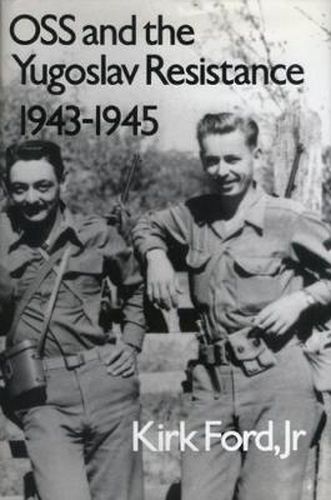Readings Newsletter
Become a Readings Member to make your shopping experience even easier.
Sign in or sign up for free!
You’re not far away from qualifying for FREE standard shipping within Australia
You’ve qualified for FREE standard shipping within Australia
The cart is loading…






This title is printed to order. This book may have been self-published. If so, we cannot guarantee the quality of the content. In the main most books will have gone through the editing process however some may not. We therefore suggest that you be aware of this before ordering this book. If in doubt check either the author or publisher’s details as we are unable to accept any returns unless they are faulty. Please contact us if you have any questions.
During the Second World War few countries provided a more difficult challenge for Gen. Wild Bill Donovan’s Office of Strategic Services than did Yugoslavia. Working with its British counterpart, OSS sought to sustain the Yugoslav resistance in its struggle against the Axis occupiers. Unfortunately, OSS personnel, who first began entering the country in the late summer of 1943, found themselves caught up in a ruthless civil war between Draza Mihailovich’s Nationalists or Chetniks and Josip-Broz Tito’s Partisans. OSS enjoyed some notable successes, ferrying badly needed supplies to Tito in the fall of 1943, assisiting in the evacuation of hundreds of Allied airmen, and collecting valuable military and political intelligence. On the other hand, President Roosevelt’s decision to allow Prime Minister Churchill to play the Allied hand in the Balkans meant that the agency would have almost no influence on Allied policy.
Kirk Ford, Jr., has mined the recently declassified operational records of the OSS and conducted interviews or correspondence with more than sixty of the surviving participants of the events in Yugoslavia. His findings challenge the view of Mihailovich as collaborator and Tito as liberator while shedding new light on both the motives behind Allied policy decisions and the extent to which these decisions affected the internal balance of power in Yugoslavia. By telling the story of the dangers OSS operatives faced behind enemy lines and by tracing the relationship between the OSS and British intelligence, Ford reveals that intrigue, deception, and secrecy were not activities reserved exclusively for the enemy.
$9.00 standard shipping within Australia
FREE standard shipping within Australia for orders over $100.00
Express & International shipping calculated at checkout
This title is printed to order. This book may have been self-published. If so, we cannot guarantee the quality of the content. In the main most books will have gone through the editing process however some may not. We therefore suggest that you be aware of this before ordering this book. If in doubt check either the author or publisher’s details as we are unable to accept any returns unless they are faulty. Please contact us if you have any questions.
During the Second World War few countries provided a more difficult challenge for Gen. Wild Bill Donovan’s Office of Strategic Services than did Yugoslavia. Working with its British counterpart, OSS sought to sustain the Yugoslav resistance in its struggle against the Axis occupiers. Unfortunately, OSS personnel, who first began entering the country in the late summer of 1943, found themselves caught up in a ruthless civil war between Draza Mihailovich’s Nationalists or Chetniks and Josip-Broz Tito’s Partisans. OSS enjoyed some notable successes, ferrying badly needed supplies to Tito in the fall of 1943, assisiting in the evacuation of hundreds of Allied airmen, and collecting valuable military and political intelligence. On the other hand, President Roosevelt’s decision to allow Prime Minister Churchill to play the Allied hand in the Balkans meant that the agency would have almost no influence on Allied policy.
Kirk Ford, Jr., has mined the recently declassified operational records of the OSS and conducted interviews or correspondence with more than sixty of the surviving participants of the events in Yugoslavia. His findings challenge the view of Mihailovich as collaborator and Tito as liberator while shedding new light on both the motives behind Allied policy decisions and the extent to which these decisions affected the internal balance of power in Yugoslavia. By telling the story of the dangers OSS operatives faced behind enemy lines and by tracing the relationship between the OSS and British intelligence, Ford reveals that intrigue, deception, and secrecy were not activities reserved exclusively for the enemy.